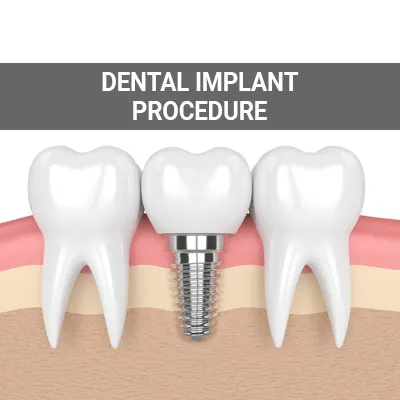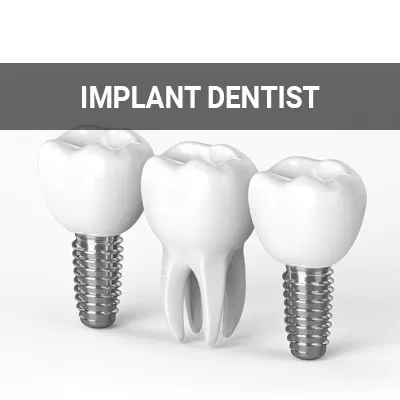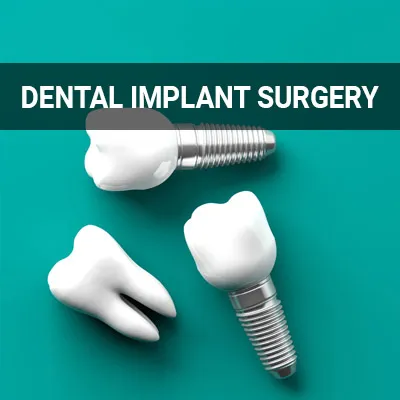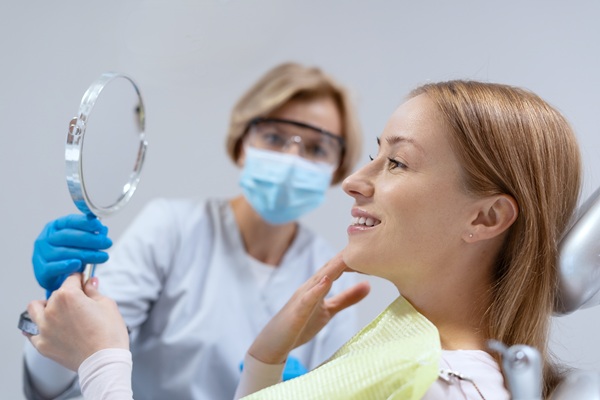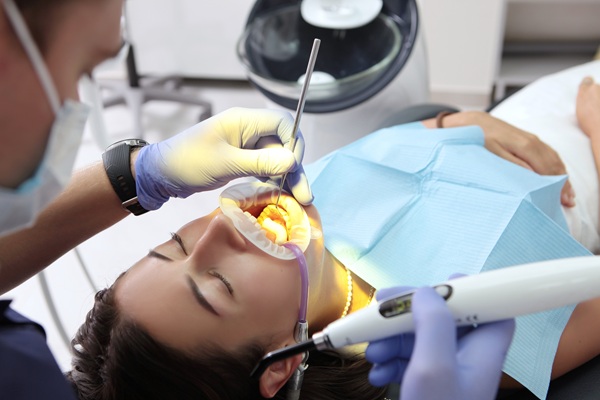Post-Op Care for Dental Implants Modesto, CA
Our guidance can help patients throughout the post-operative care period for dental implants. In most cases, the process is not nearly as complicated as people believe. By following our instructions, we can help patients avoid the risk of infection or irritating the infected area.
Here at our Modesto office, we help our dental implant patients through the recovery process, ensuring they make a full and quick recovery. We can also go over proper oral hygiene to keep dental implants in proper condition. To learn more about dental implants and post-operative care, call us at (209) 222-3636 today and schedule an appointment with Great Smiles Dental.
Common Post Operative Symptoms
The first 48 hours after the dental implant procedure are usually the most uncomfortable. Patients may experience pain, swelling, nausea, and slight bleeding. Most patients are more comfortable by the third day. Though there may still be some swelling, patients can usually start to eat normally by then. The rest of post-operative period should be a gradual but consistent improvement. If there are no improvements, patients should call the dentist office immediately.
Like with any other surgical procedure, patients may notice certain symptoms after dental implant placement — either immediately or a few days later. The key is to follow post-op instructions to ensure a safe recovery. Common symptoms include:
- Bleeding
- Nausea
- Pain
- Swelling
The effect of pain meds is different among patients. If the med does not provide substantial relief immediately, patients can try using it with an analgesic, such as ibuprofen or aspirin. The pain is usually at its peak in the first six hours after the procedure; after that, the pain should reduce considerably.
“The first 48 hours after the dental implant procedure are usually the most uncomfortable.”
Post Op Care Immediately After the Procedure
Patients must avoid disturbing the implant site to assist healing, resisting the urge to pull the lips to check the area continuously. The dentist will place sutures to maintain gum integrity. If the sutures are not self-dissolving, they should only be taken out by the dentist.
The dentist may place a healing abutment or cap over the implant for osseointegration. Qualifying patients may also get a temporary crown placed over the implant. It is vital to avoid chewing on the cap or temporary crown to prevent the implant from loosening.
Avoid rigorous exercise, bending, or lifting for at least three to four days after the procedure, as any strenuous activity may cause prolonged bleeding, pain, and swelling. The best practice is to rest in bed for the remainder of the day. Additionally, be cautious when standing, as you may become lightheaded.
“Avoid rigorous exercise, bending, or lifting for at least three to four days after the procedure, as any strenuous activity may cause prolonged bleeding, pain, and swelling.”
Post-op Follow-up Appointments
Your dentist should schedule one or more follow-up appointments after the day of surgery. You must attend all of these appointments. The number of appointments and the type of aftercare applied will depend on the treatment plan agreed upon by you and your provider.
Dental implants must be checked on regularly because there are so many elements to monitor. First, the dentist must check to ensure the implant is attaching to the jawbone properly and that there is no inflammation or signs of infection. Also, there is a slightly higher risk of gum disease in those with dental implants, leading to implant failure, among other problems. Your dentist will want to catch it early to prevent it from becoming a more serious issue.
“Dental implants must be checked or regularly because there are so many elements to monitor.”
Check out what others are saying about our dental services on Yelp: Post-Op Care for Dental Implants in Modesto, CA
Things That May Hinder Your Recovery
Just as there are things that can help expedite the healing process, there are also things that may hinder a patient's recovery. There are certain things to avoid during the recovery process, including smoking, excessive rinsing, intense exercise, hard or hot foods, and drinking with a straw.
Smoking impedes the process of osseointegration, which helps the jawbone develop and grow around the dental implants. It also slows the general healing process. Excessive, vigorous rinsing can disturb the implant site. Make sure to rest for two to three days after surgery, avoiding any exercise. Finally, the suction involved in using a straw can potentially dislodge the blood clot that forms over the implant site.
“There are certain things to avoid during the recovery process, including smoking, excessive rinsing, intense exercise, hard or hot foods, and drinking with a straw.”
Questions Answered on This Page
Q. How many follow-up appointments will you need post-op?
Q. What are some common symptoms after dental implant placement?
Q. How should I take care of myself immediately after the dental implant procedure?
Q. What types of foods and activities should be avoided during the recovery process?
Q. What dietary and lifestyle changes do I need to make after my dental implant procedure?
People Also Ask
Q. How long does the implant procedure take?
Q. What happens during the initial consultation?
Q. When should people seek an implant dentist?
Q. What are the benefits of dental implants?
Q. What can patients do to reduce their anxiety about receiving a dental implant?
Dietary and Lifestyle Changes
After the dental implant procedure, one's diet should consist primarily of nutritious food that can be eaten painlessly. Avoid eating extremely hot foods and avoid straws for a few days following the procedure. In the first few days, it is preferable (though not compulsory) to stick to liquids or pureed foods, such as puddings, soups, yogurts, and milkshakes.
Similarly, it is best to shun foods that may get stuck around the implant area, such as sunflower seeds, rice, nuts, and popcorn. However, patients can gradually return to solid foods as healing progresses. While eating may be uncomfortable, it is important to not skip meals, as nourishment is crucial for strength and recovery. Diabetic patients can maintain their meal routines or ask the doctor for instructions.
It is also vital to start proper oral hygiene as soon as possible after the procedure. Due to the swelling and soreness, it may be challenging to brush vigorously, meaning patients may need to brush within the acceptable limits of comfort. Ideally, however, patients should brush the night after the procedure, being careful around the treatment site.
If there is any minor bleeding or oozing, patients should start cleaning their mouth with saltwater rinses 24 hours after the procedure. Mildly swish the saltwater around in the mouth and let it drip into the sink. Repeat this twice or thrice daily, usually after eating. Keeping the area around the implant site clean is important for optimal and quick healing.
“After the dental implant procedure, one’s diet should consist primarily of nutritious food that can be eaten painlessly.”
Frequently Asked Questions
Q. When will it be safe for me to return to work after my dental implant procedure?
A. You can expect any swelling and soreness to last for three to five days; therefore, it is advisable to undergo surgery towards the week's end, so you can take a work break to recover. Generally, if you had the procedure on a Thursday, you can expect to return to work by Tuesday.
Q. Is there anything that can hinder the post-op recovery process?
A. Patients with uncontrolled diabetes may have complications with recovery. Patients who smoke may also be at increased risk of infection and hindered healing. Talk to your dentist about any preexisting conditions that may affect recovery.
Q. What is post-operative care like after getting the final tooth?
A. The invasive part of the procedure occurs during implant placement. Once the jaw heals around the implant, attaching the final tooth is a lot easier. Aside from some minor gum sensitivity, which can be managed with ibuprofen, there is no significant recovery process.
Q. How can I avoid infection after my dental implants procedure?
A. Keep your mouth clean whenever possible, beginning the day after surgery. Brush with a soft-bristled toothbrush and fluoridated toothpaste after meals and before bedtime. Stop any bleeding by applying gauze to the treatment area. Finally, do not rinse your mouth directly after surgery.
Dental Implant Terminology
Call Us Today
We enjoy helping our dental implant patients through every treatment stage, from the initial consultation to post-operative care. Call us at 209-222-3636 today to schedule a visit with us and learn more about the treatment and post-operative care process for dental implants.
Helpful Related Links
- American Dental Association (ADA). Glossary of Dental Clinical Terms. 2024
- American Academy of Cosmetic Dentistry® (AACD). Home Page. 2024
- WebMD. WebMD’s Oral Care Guide. 2024
About our business, license, and website security
- Great Smiles Dental was established in 2014.
- We accept the following payment methods: American Express, Cash, Check, Discover, MasterCard, and Visa
- We serve patients from the following counties: Stanislaus County and San Joaquin County
- We serve patients from the following cities: Modesto, Oakdale, Turlock, Tracy, Stockton, Lathrop, Ripon, Atwater, Salida, Manteca and Ceres
- CA (License #33512). View License Information and Specifics
- National Provider Identifier Database (1629180617). View NPI Registry Information
- Healthgrades. View Background Information and Reviews
- Norton Safe Web. View Details
- Trend Micro Site Safety Center. View Details
Back to top of Post-Op Care for Dental Implants



